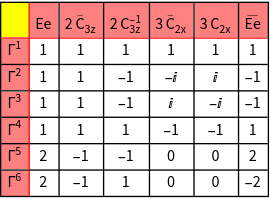GROUP THEORY SYMBOL
GTCharProjectionOperator
GTCharProjectionOperator[classes,characters,function,arguments]
applies the character projection operator corresponding to an irreducible representation to a certain function with given arguments.
DetailsDetails
- The Projection operator
 is given by
is given by  , where
, where  is the dimension of the irreducible representation
is the dimension of the irreducible representation  with characters
with characters  and
and  is the order of the group.
is the order of the group. - The characters
 belong to an irreducible representation
belong to an irreducible representation  of the group
of the group  . The classes and characters can be obtained using the command GTCharacterTable.
. The classes and characters can be obtained using the command GTCharacterTable. - arguments is a list of arguments used by function, typically {x,y,z}
- The following option can be given:
-
GOFast False Controls the input validation GOLattice {{0, 0, 0}, {0, 0, 0}, {0, 0, 0}} Gives the lattice vectors in case space groups are considered - See: W. Hergert, M. Geilhufe, Group Theory in Solid State Physics and Photonics. Problem Solving with Mathematica, chapter 5.9
ExamplesExamplesopen allclose all
Basic Examples (3)Basic Examples (3)
| In[1]:= |
For the example, the point group ![]() is considered. The point group and the character table are generated as follows:
is considered. The point group and the character table are generated as follows:
The function ![]() will be analysed.
will be analysed.
| In[4]:= |
The application of the character projection operator, related to the irreducible representation ![]() can be calculated by:
can be calculated by:
and for the irreducible representation ![]() by:
by:
The same formalism holds for the irreducible representation ![]() ,
,
GTCharProjectionOperator can also be used for 3-dimensional vector functions.
| In[1]:= |
If a double group is installed, GTCharProjectionOperator can be used for spinor functions.
| In[3]:= |













